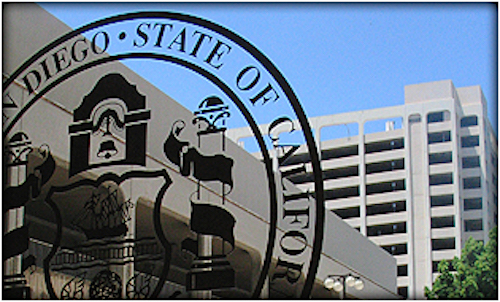
By Macy Meinhardt, Voice and Viewpoint Staff Writer
In what appears to be a syndicated effort, a group of “racist” and “anti-semitic” callers took over public comment during last week’s San Diego City Council meeting, according to officials.
“I am going to ask nicely first..please do not use words that are offensive to any particular part of our population San Diego. It will not be tolerated,” said Council Member Pro-Tem Monica Montgomery Steppe, in efforts to control the rampant dialogue.
The introduction of Zoom call-in access for meetings, while intended to enhance accessibility for residents staying informed from home, has unintentionally enabled so-called “extremist” groups to exploit governmental platforms for spreading hate both locally and state-wide, reports show.
In San Diego, offensive hate-speech has intensified across cyberspaces where governmental boards host virtual public comment, including city council, school boards, and board of supervisors.
Despite numerous reminders for speakers to stay respectful at last week’s meeting, caller after caller flooded the queue to broadcast what the city has called “racial and anti-semitic” remarks.
“I won’t repeat what was said but it was an entire day of the n-word, the c-word, racial slurs and calling Jewish people names, talking about burning down synagogues….I had to balance free speech, with ultimately cutting people off and saying I wont accept that,” said President Pro Tem Monica Montgomery Steppe, in a meeting at Rolando Community Council.
While public comment is a resource for community members to exercise freedom of speech, city leaders face a challenge of delineating the boundaries of constitutional rights in the face of hate.
“You’re finding reasons to use excuses to shut down people’s free speech. And I expect you’ll try it again during my speech right now, but I’m warning you, you are under warning and you are violating my civil rights, and I will sue your city,” argued one anonymous caller, after officials reminded him to curb his offensive language and stay on track with city matters.
When it comes to navigating hateful comments on speaker items, the city does implement certain meeting procedures. If a person veers off topic, council is allowed to step in and encourage the speaker to stay on topic. If they continue to violate direction, officials are authorized to end their speaking session on that particular item. Law enforcement is not permitted to get involved unless a speaker is over the line disruptive in instances such as screaming or yelling. In the case of the anonymous virtual callers, all city officials could do was mute their microphone.
“These eight to ten callers went, you know, really went off topic and used some vile and terrible language, racist and bigoted language,” said Councilmember Campillo in an interview with Voice and Viewpoint.
As outrageous and hurtful as comments were, “the verbal utterance of opinions, no matter how disagreeable they are, cannot be criminalized. So what we can only do is run our meeting and follow the and enforce our rules for running the meeting,” said Councilmember Campillo.
Meanwhile after the meeting, city leaders swiftly took to social media to put out statements of condemnation towards the individual callers.
“While we welcome all people of the public to participate in City Council, we condemn the participation that introduces outright hateful language against race, ethnicity, religion, sexual orientation, or any further identities that make up our region.”
“We speak in solidarity that there is no space for hate speech and violent misinformation in our city.”
San Diego City Council is celebratory of the fact that it is the most diverse council in the city’s history, however with that comes targeted offenses often hurled at the city council members directly.
As the public comment moderator, and serving in the position of President Pro-Tem, Councilmember Montgomery Steppe was subjected to a handful of these remarks, specifically when she would politely ask the callers to stay on track.
In a study produced by the Anti-Defamation League on harassment against local officials, studies found that women officials were targeted at a higher frequency than others, totaling 42.5% of incidents.
“The sobering findings reinforce observed sexualized and gendered violent threats against women in politics, amplified under new levels of polarization and with social media tools,” the ADL states.
Further studies show that this is an excessive pattern particularly amongst Black women in positions of power. In 2021, a Women Mayors Network survey showed that political violence against mayors is common and “more prevalent for women mayors and mayors of color.”
Furthermore, it appears these groups of callers may not be San Diego residents, but rather a group of individuals with similar targets and agendas stretching across the West Coast. Since last week, reports have captured this occurrence in Sacramento, El Cerrito, Monterey, Sonoma and even Portland City Council.
What happened is part of a larger trend, tracked by ADL Center on Extremism, of extremists using public forums like city council meetings to espouse antisemitic speech, according to the Anti-Defamation League.
However, the hate speech last week was not just targeted at jewish communities but rather all communities that are not white.
“On Monday, they then started making anti Black comments when Council President Pro-Tem Montgomery Steppe intervened to stop them from their vile comments, and it veered off into anti LGBTQ comments. And so this group of people might be using one message today, but they are fundamentally against each racial group that is not white,” said Councilmember Campillo.
In terms of if this pattern should intensify in the future, Councilmember Campillo claims that it is within the cities “toolbox” to eliminate the zoom call in feature, as they are not legally binded to host it.
However, in efforts to maintain the ability for abiding participants to speak and share their thoughts with city leaders, the virtual call-in feature will remain for now. In the meantime, San Diego leaders say they will remain vigilant for like-minded hate speech attacks in the future.


